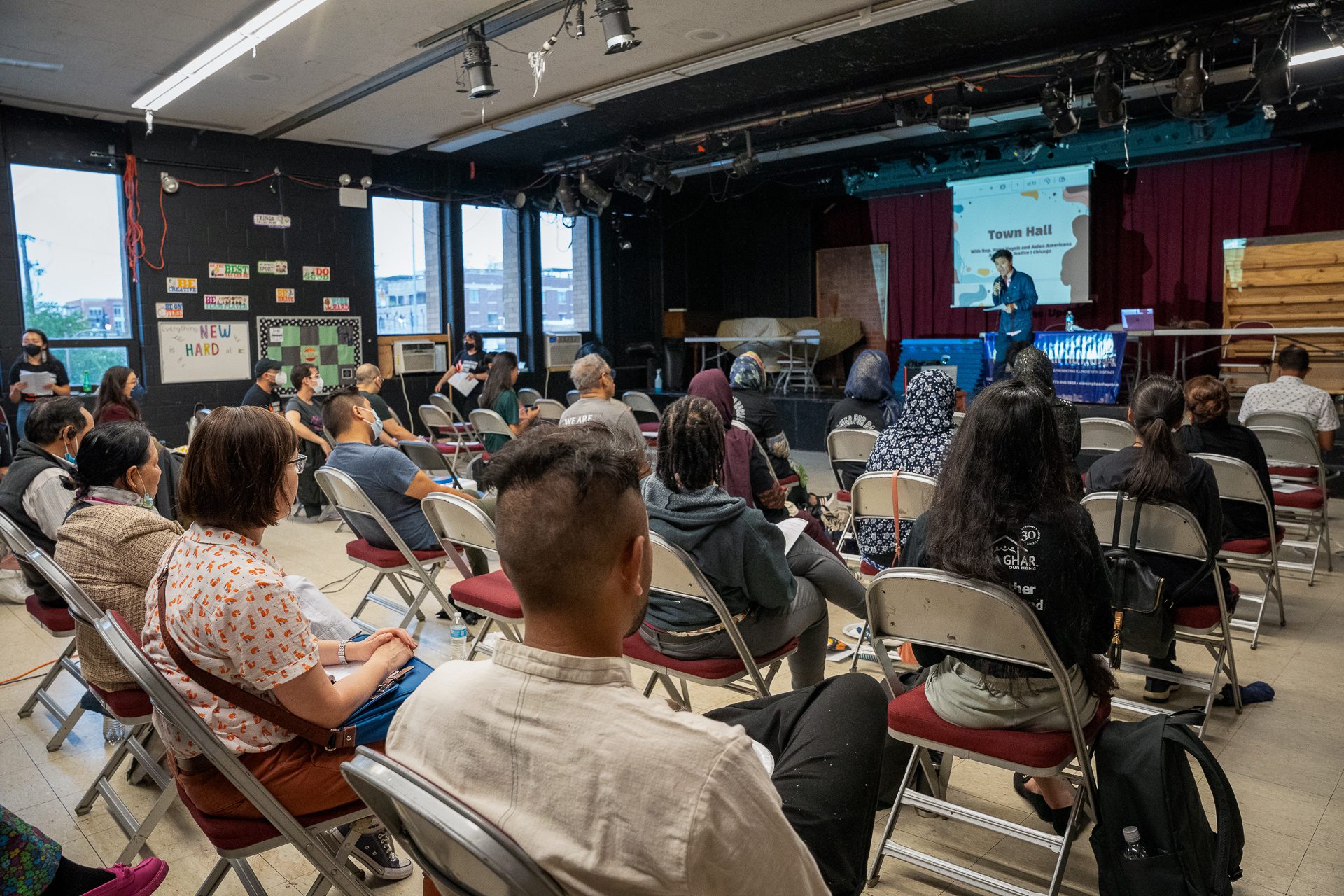 Efrain Soriano/Borderless Magazine
Efrain Soriano/Borderless MagazineA language access bill making its way through Springfield would create a new office tasked with bringing interpretation and translation services to state agencies for many non-native English speakers.
For years, advocates like Ellen Zhou have pushed for robust language services at state agencies to support immigrants with limited English speaking abilities.
As a child, Zhou translated for family members for whom English was a second language. Often, she felt gaps in her ability to convey critical information and wondered how these experiences could be different if a translator and other language services were available.
News that puts power under the spotlight and communities at the center.
Sign up for our free newsletter and get updates twice a week.
“I was in an experience where I had to be the person to deliver vital healthcare information because there was no translator,” Zhou recalled. “I’m not supposed to be the provider in that situation, but you kind of get roped in inadvertently and … because there’s this translation gap, the care being delivered is also not enough.”
Zhou, an organizer with the advocacy nonprofit Asian Americans Advancing Justice Chicago, became passionate about the issue after a relative suffered a mental health crisis. The lack of translation services and the subsequent fallout profoundly impacted her family.
But her experience isn’t an isolated one.
Members of Advancing Justice Chicago said thousands of immigrants across Illinois experience similar challenges navigating state services. They argue that translation services would cut language barriers and improve support for non-native English speakers.

Now, legislation making its way through Springfield could require state agencies to translate documents and provide interpretation services for some non-English languages — paid for by the state.
The Language Access legislation comes as thousands of Venezuelan migrants are bused to Chicago as part of Texas Gov. Greg Abbott’s political stunt. Many local organizers and political supporters of the bill believe its passage could be the first step in creating a more equitable state by making Illinois services and programs more accessible for immigrants and non-native English speakers at a critical time.
“Navigating state services can be complicated, but for individuals with limited English abilities, it can be nearly impossible,” said State Rep. Dagmara Avelar, who introduced the bill earlier this year. “That’s always been unacceptable, and this bill is the first step to remedying that injustice. Increased language equity and access uplifts Illinoisans statewide, especially immigrants and communities of color.”
Read More of Our Coverage
A need for language services in Illinois
Since the bill’s introduction earlier this year, Advancing Justice Chicago has hosted town halls to educate community members about the legislation, share personal stories of language barriers, and highlight the importance of expanding language access for non-native English speakers.
“By sharing a lot of these stories and making this more known to legislators and community members, that puts additional pressure on lawmakers to act and treat this as the urgent issue that it is, said Ricky Gandhi, political director for Advancing Justice Chicago.
In Cook County, over 35 percent of people speak a language other than English at home, and more than 20 percent of residents were born outside of the United States, according to data from the Chicago Metropolitan Agency for Planning.
Many non-English speaking immigrants struggle to access information at state agencies such as Social Security offices and the Department of Motor Vehicles, which do not provide enough accommodations to those with low English proficiency, advocates say.

Illinois House Bill 3222, known as the Language Equity and Access Act, passed the House in April and now goes before the state senate during the 2023 Illinois General Assembly veto session this fall.
If passed, the Language Equity and Access Act would create an Office of Language Equity and Access within the Governor’s Office of New Americans to ensure access to state information, services, programs, and activities for people with limited English proficiency.
A bilingual director will work with state agencies to develop and implement plans, including translated documents and interpreters for legal, administrative hearings and health services. Services would be offered to non-English speaking groups that comprise at least five percent of the population, according to the bill.
Currently, only some Illinois state agencies provide services in languages other than English. The Illinois Department of Public Health provides free language assistance services, such as interpreters and documents translated into over 100 languages. The department also has Spanish-speaking staff. The Illinois State Board of Education, the Illinois Department of Revenue, and the Illinois Courts have similar language access programs and services.
Read More of Our Coverage
In Chicago, former Mayor Rahm Emanuel passed the Language Access Ordinance in 2015, which tasked each city department with creating a Language Access Policy and Implementation Plan to help Chicagoans with limited English proficiency receive services and information for the most commonly spoken languages Spanish, Mandarin, Polish, Arabic, Hindi and Urdu.
But many organizers feel local departments with language services don’t go far enough, especially as new busloads of migrants are arriving in Chicago daily.
When residents cannot receive the services and resources from local government, community organizations that are underfunded and understaffed are often left to pick up the slack, Gandhi said.
“This is a state responsibility to make sure that their services are accessible to people,” he said
Language access is the first step in improving the lives of immigrants, supporters say
State Rep. Hoan Huynh, a Language Equity and Access Act bill sponsor, believes the legislation would provide new immigrants and refugees with resources to settle in a new country without facing language barriers to access critical resources.
Huynh, a son of Vietnam War refugees, grew up translating and interpreting for his parents. Passing the Language Equity and Access Act would ease the translation burden off of children of immigrants by making state resources more accessible, he said.
“We want to make sure that these agencies, which are often times the first point of contact for a lot of our constituents and our neighbors, that when they interact with these agencies, that they’re able to be able to deliver these resources in the language or languages that will be applicable for our neighborhoods and for our community,” Rep. Huynh said.
Such language access services are not unprecedented. Huynh points to California as a leader in translation and bilingual language services.
Over the years, California has passed multiple laws to bolster language services for non-English speaking residents, including a 2016 bill that reversed a 1998 law severely restricting bilingual education programs.
Hawaii, which has the highest per-capita of non-English proficient speakers, has also tried to address language barriers. In 2006, it became the first state to pass language access legislation. The law created the Office of Language Access, ensuring people with limited English abilities can access state-funded programs, services and activities.
Rep. Huynh sees the Illinois state budget as a moral document that should reflect the values and priorities of the state and improve the lives of immigrants statewide.
The bill is crucial to ensure people immigrating from different countries can access the services that help support our neighbors, our families and our young children, Huynh said. “I would argue that the cost of not doing something like this is actually going to be more than the cost of doing it,” he added.
While legislators consider the bill, organizer Ellen Zhou continues to educate community members on the importance of such services for immigrants with limited English speaking skills, saying it is necessary to make Illinois a more accessible, equitable state for immigrants and people with limited English speaking abilities.
“I totally view it as a first step to at least… start building accountability with state agencies” and providing language access, especially in the face of the city’s current refugee crisis, Zhou said.

